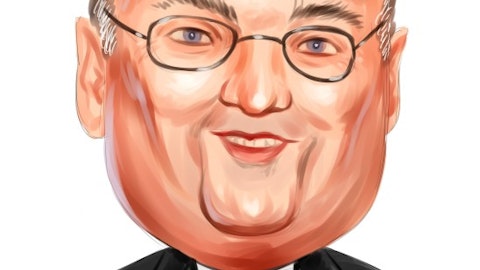Strauss Zelnick: Yes. I mean you don’t want to generalize to our business too much from what’s going on in linear entertainment because the increase in subscription pricing and linear entertainment is really a reflection of the fact that too many streaming services were underpricing to acquire customers and then they realize those customers were not durable and the LTVs were upside down. So they were basically adjusting their pricing to make sure that the LTVs are potentially positive. And I think there’s still more pain to come for some of those services, and I can wax eloquent if you want, although it has nothing to do with our business. In terms of pricing for any entertainment property, basically the algorithm is the value of the expected entertainment usage, which is to say that the per hour value times the number of expected hours plus the terminal value that’s perceived by the customer in ownership if the title is actually owned, not say, rented or subscribed to.
And you’ll see that, that bears out in every kind of entertainment vehicle. By that standard, our frontline prices are still very, very low because we offer many hours of engagement. The value of the engagement is very high. So I think the industry, as a whole, offers a terrific price-to-value opportunity for consumers. That doesn’t necessarily mean that the industry has pricing power or wants to have pricing power. However, there is a great deal of value offered. And look, it’s our strategy here to deliver much more value than what we charge consumers. It’s always been our strategy here. We want to make sure the experience is first class, and the nature of the experience is not just the quality of what we offer, it’s also what you pay for it, everyone knows that anecdotally.
So that’s how we look at it. There have been precious few price increases in the business. The price increase, for example, the $70 for certain frontline products was the first price increase in many years after many generations. So again, I think we offer a terrific value to consumers. On the second question?
Karl Slatoff: DTC.
Strauss Zelnick: Regarding the direct-to-consumer platform, we think there continues to be a great deal of upside there, again, for consumers and also for our margins. It’s still a relatively small part of our business. There’s a great opportunity for growth. To be clear, we will always work with third-party retailers. We want to be where the consumer is. We value our third-party retailer relationships, they do provide marketing support. That’s important to us. There are times when consumers want to have a direct relationship. We can do both. We can do all of the above. It is not our strategy to bring everything in-house.
Eric Sheridan: Okay. Thank you.
Operator: Our next question comes from the line of Drew Crum with Stifel. Please proceed.
Drew Crum: Okay. Thanks, guys. Good afternoon. So Strauss, you mentioned that the business is well positioned for the holiday season. What’s driving that confidence? And how would you assess the health of your consumer? And then separately, I know it’s just a subtle change to RCS, but what’s behind the adjustment to that figure for the second half, given your fiscal 2Q is in line? It looks like just based on the commentary around the net bookings mix of Zynga, but just want to confirm that. Thanks.
Karl Slatoff: So speaking to the confidence of our holiday season. Look, simply, I think it’s the strength of our catalog and the strength of our products and a lot of our releases are must-have releases. And any time you’re heading into a holiday season, and I think everyone around the table and on the phone is hopeful that we’re going to have a very strong hardware season this year. We do have a lot of titles that we think are sort of go-to titles for people to engage with. Besides — and also, you’re obviously — we’re also working off of the results that we’ve had to date, which are very strong. So the momentum feels positive. We’ve got a great lineup in place. And it looks like it’s going to be a pretty good holiday season from a consumer perspective, particularly in the gaming space.
Lainie Goldstein: And for the RCS, the main driver is the reduction in Zynga’s business for the remainder of the year. So we forecasted some of our titles including a more muted expectation for the holiday based on the current trends. And we’re also continuing to focus on profitability in hyper-casual, which is reducing our top line but enhancing our margins. And then there’s also some shifts in the pipeline, including Star Wars: Hunters.
Drew Crum: Helpful. Thanks, guys.
Operator: Our next question comes from the line of Omar Dessouky with Bank of America. Please proceed.
Omar Dessouky: Hi. Thanks so much for taking the question. I just wanted to get a little bit of clarification on what you said about shifts in your pipeline causing your fiscal ’25 guide to be not materially below $8 billion. Is that because of shifts in your very largest AAA games in the pipeline, your smaller AAA games in the pipeline or your mobile games? If you could provide some clarity on that, I’d appreciate it. Then I have a follow-up. Thanks.
Strauss Zelnick: Yes. We haven’t even issued initial guidance for the year. We do that in the spring of the New Year, and that’s when we’ll give a lot more specificity around the release schedule. However, I want to reiterate, we are going to be shy of $8 billion in fiscal ’25, but not materially so.
Omar Dessouky: Okay. Right. No problem. So then the other question is, obviously, super happy to see Sam Houser’s message about Grand Theft Auto VI — next Grand Theft Auto trailer coming soon. On September 26th, the SAG-AFTRA voted to approve strike authorization for video game performers covered under the Union’s Interactive Media Agreement. Now they haven’t actually strike yet, but there are negotiations. And I wanted to know whether if voice actors and motion capture actors were to go on strike, would it slow down the production of the next Grand Theft Auto at Rockstar. Does Rockstar have the type of employment contracts that would allow the workers, the actors to work through a strike?
Strauss Zelnick: Negotiations are expected to resume next week. We’re optimistic and value all of our talent greatly, and we value excellent labor relations and we’re looking forward to reaching an agreement that serves everyone well. That’s always been my approach. I’ve been involved with labor negotiations in every entertainment industry there is in my career. They’ve always worked out just fine. In the event that they don’t work out just fine, now we are completely protected.
Omar Dessouky: Thank you.





